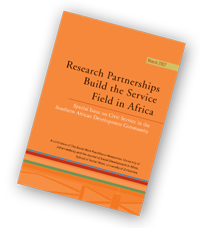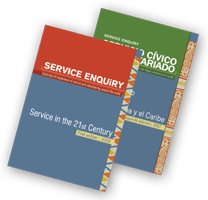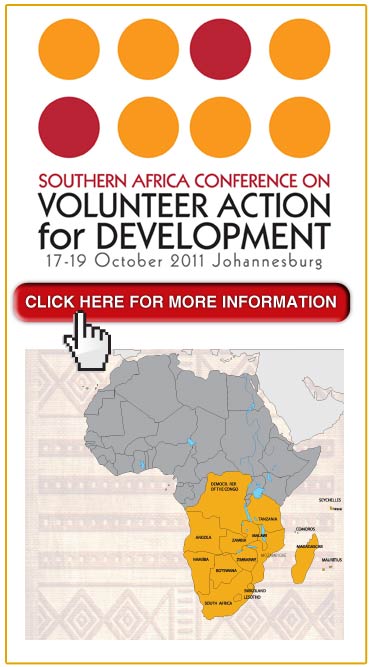Conference Declaration
![]() Click here to download a pdf version of the Conference Declaration.
Click here to download a pdf version of the Conference Declaration.
CREATING AN ENABLING ENVIRONMENT FOR VOLUNTEER ACTION IN THE REGION
Final declaration adopted on 19 October 2011 at the close of the Southern Africa Conference on Volunteer Action for Development in Johannesburg.
Volunteering is universal, inclusive and embraces free will, solidarity, dignity and trust. Throughout the Southern African region, strong traditions of volunteering are an expression of Ubuntu, the African philosophy and way of life, which connects individuals and communities through reciprocity and provides a powerful basis for unity, common humanity, peace and development.
In the spirit of the tenth anniversary of the International Year of Volunteers (IYV+10) we recognise and celebrate the contribution of the millions of volunteers for national and regional development in Southern Africa. In particular, we acknowledge the role of volunteers – men, women, old and young – in poor communities who daily provide the support required to combat the ravages of poverty and ill-health.
As volunteers and advocates, policy makers, supporters and practitioners of volunteering – a cross-section of members of the volunteerism movement in Southern Africa – gathered here in Johannesburg on 19 October 2011, we reaffirm that:
a. Volunteering is a universal form of civic engagement. It serves as a transformational force in society and contributes to poverty eradication through community-centred sustainable development that builds livelihoods, strengthens social cohesion and promotes human development.
b. Volunteering is central to environmental sustainability and plays an important role in disaster mitigation and crisis prevention.
c. Volunteer action plays a role in advancing regional efforts to combat the HIV/AIDS pandemic through care and prevention, to promote social and economic participation among youth, and to foster peace and social cohesion within and between countries.
d. Regional integration and a sense of regional identity, connectedness and solidarity can be strengthened through all forms of volunteering that are community-centred, gender-sensitive and based on mutual respect, human dignity and reciprocity. These include youth volunteering, community-based volunteering, international volunteering, faith-based volunteering, diaspora volunteering, corporate support for volunteer action, elder service, online volunteering and higher education community engagement.
e. Volunteering builds social cohesion and social capital among diverse groups based on real needs and assets when developed from the bottom up through grassroots empowerment and community voluntary action.
f. While volunteering cannot replace effective education and training systems, it can increase the employability and holistic development of young people through experiential and inter-cultural learning, which produces the skills and capabilities relevant to the workplace, innovation, entrepreneurship and community leadership.
g. Volunteering facilitates social inclusion, including volunteering for and with refugees, internally-displaced people and all marginalised groups irrespective of gender, age, cultural background, disabilities or socio-economic status.
h. Through teaching, research and community engagement, higher education institutions in Southern Africa play a major role in developing responsive citizens.
We urge:
1. Stakeholders, including all volunteer-involving organisations, governments and member states, parliamentarians, private sector organisations, higher education institutions and other development partners to increase investment in, improve and widen regional and institutional collaboration during IYV+10 and beyond and to draw on the value of volunteering in addressing development challenges, fostering peace and advancing human well-being. This includes:
a. Showcasing and celebrating the diverse contributions of volunteering and civic engagement in general to achieving the objectives of peace and development;
b. Identifying opportunities and strategies to strengthen the role of voluntary service in national and regional development;
c. Documenting and increasing research on the nature, scope, impact and value of voluntary service;
d. Exploring the potential for establishing a variety of regional voluntary service exchange programmes in Southern Africa that promote inter-cultural learning and awareness to support national, regional and international development;
e. Strengthening the effectiveness of international volunteering in all its forms through a commitment to mutual learning, reciprocity, collaboration and constant reflection;
f. Creating an enabling environment for volunteering and civic engagement by fostering policies and sharing good practices to scale up opportunities for people to volunteer, build new capacity for well-managed programmes, and identify community needs, assets and knowledge for transformational change;
g. Exploring new forms of volunteering by connecting and engaging people through information and communication technologies;
h. Enhancing private sector support for voluntary action through collaborative corporate community partnerships (including employee volunteering) that recognise the interdependence between business and societies and leverage the unique value that
companies can add to sustainable development;
i. Integrating the impact of volunteering into the monitoring of cross-sectoral development objectives and MDG achievement; this includes noting that the extent of community participation is itself an indicator of progress in societal well-being;
j. Undertaking volunteering using a holistic approach, that prioritises human rights, gender equality, sustainability, and economic and social development;
k. Accelerating and integrating higher education community engagement for increased scope, depth, visibility and impact so as to form a core component of knowledge production in the region.
2. Governments of Southern African member states and other stakeholders to incorporate volunteering in their forthcoming deliberations for “Rio + 20” and recognise the transformational power as well as economic and social value of volunteering in achieving national development goals and regional priorities by facilitating the creation of an enabling environment for volunteering, which supports, protects and empowers volunteers.
3. Southern African Member States and Regional Bodies, the United Nations system, development partners and Volunteer Involving Organisations and other stakeholders to renew efforts through collaboration to implement resolution 56/38 and subsequent resolutions of the United Nations General Assembly (UNGA) on measures to support, promote and advocate for volunteering as a powerful means for transformational change and sustainable development, particularly in Southern Africa.
4. All stakeholders to call for volunteer coalitions to provide a platform for knowledge sharing, capacity building and collective action for achieving peace and sustainable development goals through volunteer action.
We commit to bringing this declaration to the attention of our constituencies in our different institutions and countries and regional organizations.

VOSESA's Five-Country Cross-National Study on Civic Service and Volunteering in SADC.
Read more

Service Enquiry, an online publication available free-of-charge that documents and analyses the experience of civic service and volunteerism in different parts of the world.
Read more
 VOSESA's analysis of the volunteering response to the 2008 Xenophobic Attacks in South Africa and its potential for social change.
VOSESA's analysis of the volunteering response to the 2008 Xenophobic Attacks in South Africa and its potential for social change. Download paper


